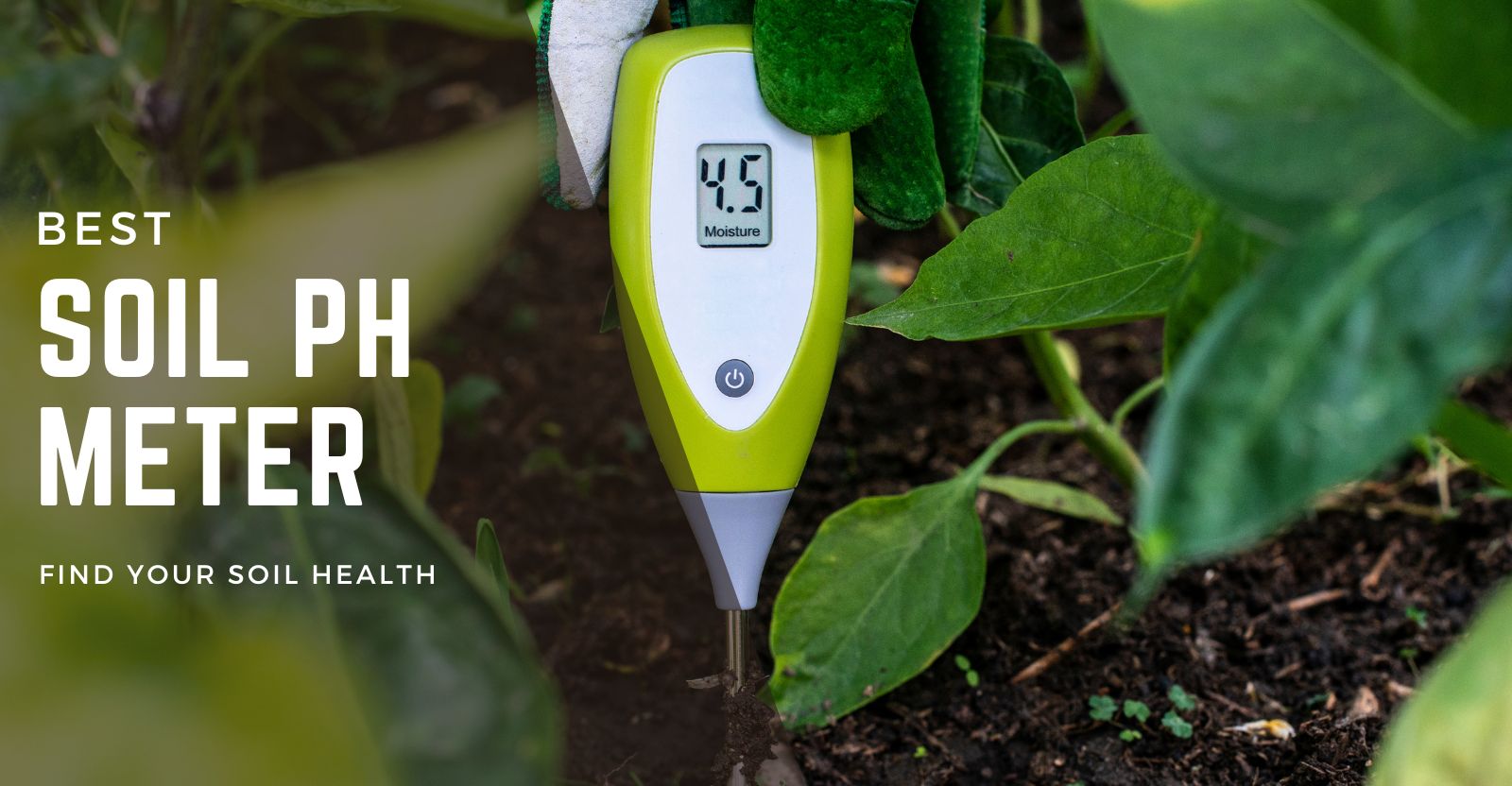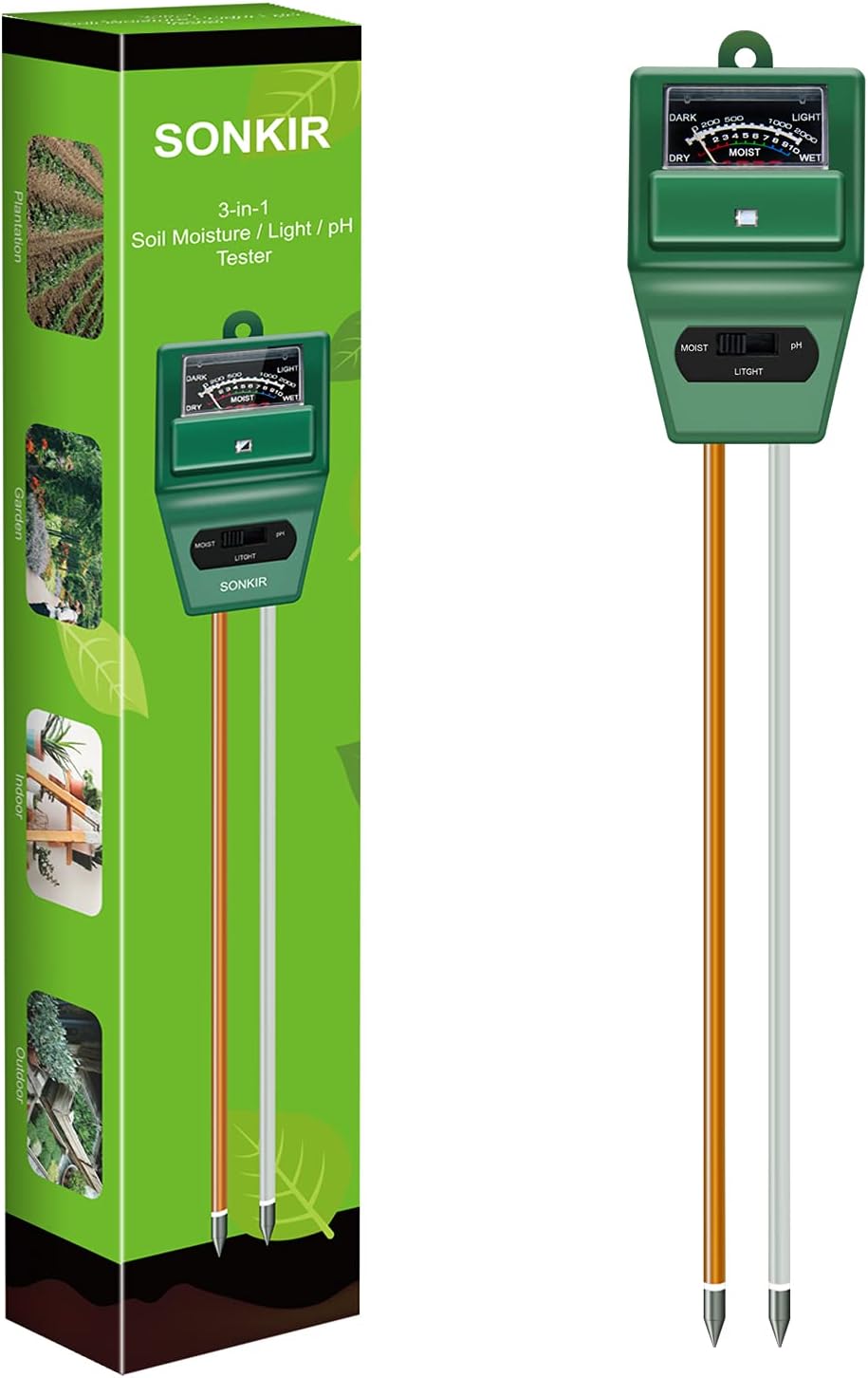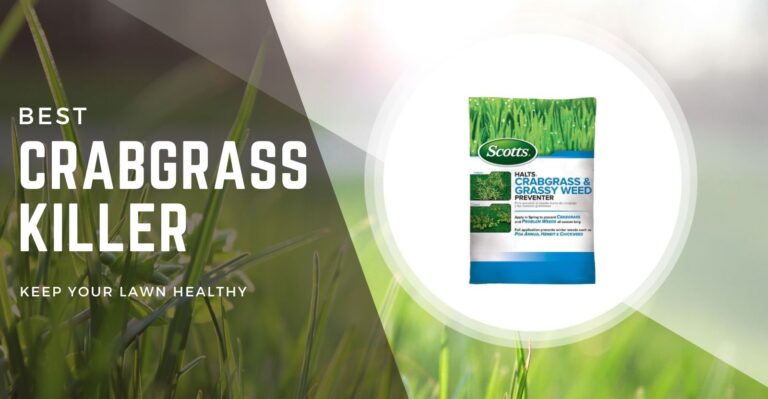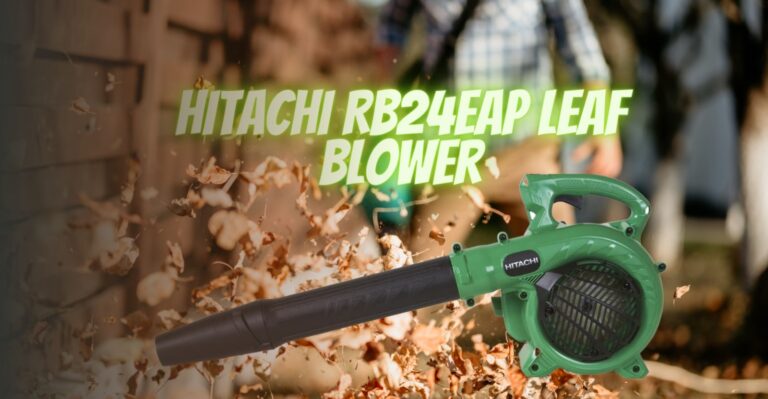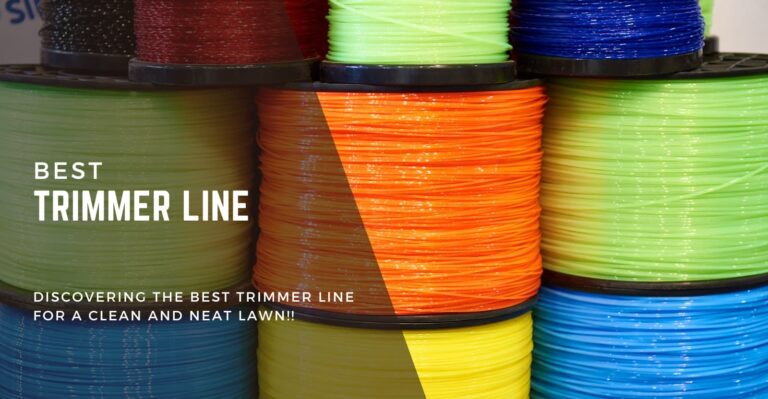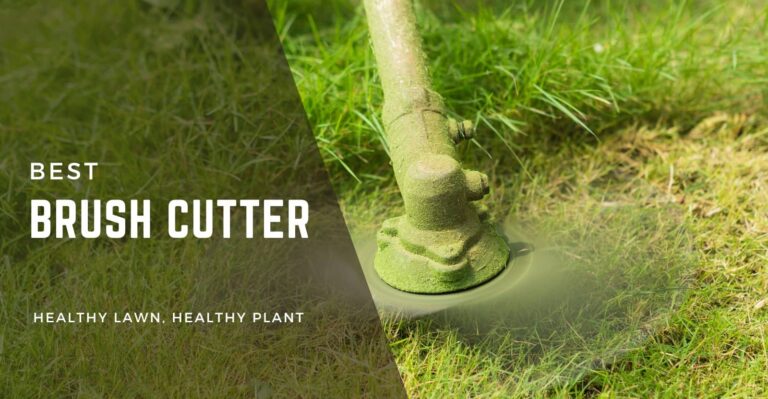Amazon has put together some great Home Gift Deals – save money and get your shopping done at the comfort of your home! Click here to see deals on Amazon
Garden soil is a complex thing. It’s home to billions of living organisms, and it can be hard to know what needs to happen for your soil to be healthy. One of the most important things you need to know about the health of your soil is its pH level.
A garden’s soil pH can fluctuate quickly based on natural processes, so you must test your soil regularly. Finding the right pH level for your soil can significantly impact your garden’s health.
Here are some of the best soil pH testers available in the market and their pros and cons. Later in the guide, we have covered things to consider when buying a soil pH tester. If you’re in a rush, you can pick from our top three.
Quick Picks
We may earn a small commission, at no cost to you, when you buy from our link to support us. More
Kensizer 3-in-1 Soil Tester
Multifunctional meter with digital plant probe that can test soil moisture, pH value, and sunlight. A pair of double probe detectors makes it easy to get into the soil.
HighLandy Soil pH Meter 3-in-1 Soil Tester
It’s a professional, palm-sized tool that quickly and accurately detects the soil’s pH acidity and moisture. It is a great help for gardeners, farmers, and landscapers.
Atree Soil pH Meter
It’s a precise, accurate, and versatile device to measure the pH level of the soil. The easy-to-read color display shows the pH level with accuracy.
Top pH Tester Available in the Market
Product
Name
Detail
Price
- Multifunctional meter
- Portable
- Digital screen
- Easy to use
- Multifunction meter
- No battery needed
- Lightweight and portable
- Double probe detection
- Multifunctional
- LED display
- Includes pH reference
- Can do 25 tests
- Fast test result
- 100 pH test strips
- Improved accuracy
- Accurate result
- Easy to use
- Test pH, soil moisture and sunlight level
- Manual dial
- Multifunctional
- Indoor and outdoor use
What is the soil pH, and why it’s important?
A soil’s acidity, or pH level, can measure how acidic or basic (alkaline) it is. The scale ranges from 0 to 14, with seven being neutral. The pH of your soil determines which plants can thrive in your garden. The “p” is for potential, and “H” is for hydrogen when we say pH. It’s a mathematical logarithmic scale that represents the hydrogen ion in the soil.
For most edible and ornamental gardens, a pH level of 6.5 is ideal, but it may be different for other plants. Before you start planting a new garden, be sure to test the soil’s pH level. If it turns out to be too acidic or basic, you will need to amend your soil to bring it to an acceptable pH level.
Maintaining proper pH levels is crucial as it helps soil absorb and transfer the required nutrients to the plant. For example, when the ground has a low pH level, it means it’s acidic.
The highly acidic soil causes reduced absorption of nutrients such as phosphorous while accelerating the accumulation of other minerals, causing a nutrient imbalance in the ground. Some beneficial bacteria for the soil can’t survive in the highly acidic soil.
Similarly, the highly alkaline soil prevents essential minerals such as iron, zinc, copper, and magnesium from being adequately absorbed by the ground, vital for plants and grass growth.
How to read a soil pH tester results?
There are many different types of pH testers available on the market. The most common types are:
Liquid Soil pH test kits: These kits contain a liquid solution with a color indicator strip and instructions to test soil composition. You need to collect a sample from the garden, mix it with water then compare the resulting color to a color chart included in the kit. You can interpret results easily by comparing them to a number on a color comparator chart.
Electronic soil pH tester: These electronic meter testers measure pH levels at the surface or subsurface of soil samples and give you an accurate reading in minutes. It has probing electrodes that count the number of hydrogen ions in the soil.
A multifunctional electronic pH tester can perform both micronutrient and macronutrient testing. It gives you the reading on an electronic display with an NPK rating that tells you the amount of nitrogen (N), phosphorous (P), and potassium (K) concentrations in the soil.
Handheld soil pH tester: This is a portable meter to take it anywhere to measure the pH. It has a display at the front that indicates the reading when you insert an electrode inside the soil mixed water solution.
What is the best time to do a soil pH test?
The pH level of your soil can be a game-changer for your garden. It can either make or break the plants you’re trying to grow. Knowing how often to do a soil pH test and the best time for the test will depend on specific factors like types of plants you want to grow, amount of rain, type of soil, etc.
The best time to do a soil pH test is usually in the fall after most plants have died or been harvested for winter storage. You can also test it in the spring before starting a new garden or planting new plants.
However, experts recommend doing soil pH testing in the fall. In this way, you will have enough time to make any required amendments to your soil before you start planting in the spring.
What to consider when buying soil pH tester
Multifunctional
A multifunctional meter tests not only pH levels in soil but also moisture and sunlight levels.
Accuracy
A pH is calibrated to provide accurate test results within a certain range. Check if your soil pH falls in that range.
Portability
A portable pH meter makes it convenient to use that you can carry in your pocket and is easy to store when not in use.
Have a question about buying a soil pH tester? Contact us
Best Soil pH Tester Kit Review
1. Broadsheet 5 in 1 Soil Test Kit
Best Digital Soil Tester
A comprehensive package of gardening tools, the Broadsheet 5 in 1 soil test kit, will be indispensable for any gardener. With the size of a compact ruler and weighing under 3 ounces, this soil tester is easy to carry around and use anywhere.
The kit has five functions: test environmental humidity, check soil temperature, measure soil moisture, know the light intensity, and determine acidity pH value. To ensure accurate results, the tester provides a high-definition screen with a backlight design to allow you to read data in the dark.
Conducting soil tests can be tricky, but it has easy-to-follow instructions to walk through the process. You just take your probe and insert it in the ground. The display screen will tell you the pH level when the test concludes in a few seconds.
See More information about: Broadsheet 5 in 1 Soil Test Kit
Pros
Cons
2. Atree Soil 3-in-1 Soil Tester Kit
Budget-Friendly Soil Testter
Whether you’re new to gardening or a seasoned veteran, the Atree soil pH meter will make your gardening journey easier and more enjoyable. It’s easy to use and has three functions: Moisture tester, pH tester, and light intensity tester.
This helpful tool can help you grow your plants strong and healthy all year round. The measurement process is easy and fast. All you have to do is put the sensors into a few centimeters of the soil, wait for a few seconds, then check the readings on the LCD screen.
The compact design makes it easy to take with you on trips or carry around in your pocket so you can monitor the pH of your soil and away. The sensor is on the front of the unit, which I find less practical.
However, regardless of the sunlight sensor in this position, it’s a pretty good deal for the price. The device is made of high-quality plastic, making it durable and long-lasting. It has a simple design with easy-to-read displays.
See More information about: Atree Soil 3-in-1 Soil Tester Kit
Pros
Cons
3. Kensizer 3-in-1 Soil Tester
Multifunctional Soil pH tester
Growing plants can be a tricky business. Many variables go into the health and well-being of your garden. With this 3-in-1 soil tester, you’ll know to make better choices for your plants. This tester will help you test soil moisture, pH value, and sunlight level, so you know what’s going on under the surface.
The clear reading dashboard and quick response will give you all the required information you need to take care of your plants. It’s quick and easy to use this soil tester—just insert the probe into your chosen area of soil and push a button to take accurate pH measurements.
The Kensizer 3-in-1 soul tester helps you determine your soil type with just a few simple steps:
- Scrape away a small amount of topsoil from your garden bed and add it to the tester.
- Add water to produce soil mixture solution.
- Insert the sensor into the ground and read out the results on display.
See More information about: Kensizer 3-in-1 Soil Tester
Pros
Cons
4. Luster Leaf 1605 Digital Soil Test Kit for pH
Best for Limited Use
Are you a budding gardener? If so, this soil pH tester is the perfect tool for you. Straightforward and easy to use, this kit will help ensure your plants are receiving the proper amount of nutrients to flourish. With a simple push of a button, you can quickly determine how acidic or alkaline your soil’s current pH level is.
It gives a highly accurate result to know precisely what plant would thrive best in your garden. This is perfect for the gardener who is unsure where to start. The booklet has guidelines for fertilizer based on the pH, nitrogen, phosphorus, and potash tests. Perfect for those starting out planting a garden this spring!
See More information about: Luster Leaf 1605 Digital Soil Test Kit for pH
Pros
Cons
5. Garden Tutor Soil pH Test Strips Kit
Best for Regular Gardening
The Garden Tutor soil pH test strip kit is a quick and accurate method for everyone to measure the pH of their soil at home with a simple testing kit. You’re no longer waiting for your soil test results for days or weeks.
Simply remove one pad from the package, place it in your garden, and wait 60 seconds for fast and accurate readings. The kit includes two pads with calibrations designed explicitly for soil pH testing and a detailed instruction sheet with clear directions on how to use the kit.
The kit includes 100 strips to test the pH of your soil and is perfect for determining what you need for your specific area. This kit will save you time and money on costly visits to the nursery or landscaping company. The soil pH color comparison chart helps you identify if your plant needs an adjustment.
See More information about: Garden Tutor Soil pH Test Strips Kit
Pros
Cons
6. HighLandy Soil pH Meter 3-in-1 Soil Tester
Most Accurate Soil pH Tester
The HighLandy Soil meter tester can give you all the correct information to grow your best crops for the ultimate gardener. It has a premium grade double-needle detection technology that helps you analyze soil moisture and pH acidity levels.
With these measurements, you know exactly how much water your soil needs, what type of fertilizer your plants need, and whether or not your plants are at risk for nutrient deficiency.
This device is easy for soil testing of moisture and pH level. Simply insert the probes deep in 4–6 inches of soil, and you’ll get your readings. You won’t need batteries or electricity with this device.
This is a perfect solution for measuring the pH levels of your soil. This little guy will tell you within seconds whether your soil is too acidic, too alkaline, or just right.
See More information about: HighLandy Soil pH Meter 3-in-1 Soil Tester
Pros
Cons
7. Sonkir Soil pH Meter
Dual Probe Soil pH Tester
Sonkir soil pH meter is perfect for measuring soil moisture, pH value, and the sunlight level of plants. You can use the meter to determine your plant’s watering needs precisely. The meter is very easy to use—simply insert the probe into your plant’s soil and read off the corresponding data on display.
You get an accurate reading in seconds without having to dig up your plants. It doesn’t need external batteries. The lightweight and portable design make it easy to use in the greenhouse or outdoors. It can test pH ranges 3.5 to 8 and moisture range rating of 1 to 10 with 1–3 means dry, 4–7 normal, and 8–10 means wet moisture levels.
The dual copper and aluminum probe are sensitive enough to give fast, accurate readings. With this handy and lightweight meter, you can easily and accurately test your soil and light level, so you know what adjustments need to be made. No guesswork is required.
See More information about: Sonkir Soil pH Meter
Pros
Cons
Are cheap soil pH meters accurate?
Some people think that a low-quality soil pH tester kit can give accurate ratings. But this isn’t true. You should use a quality pH testing kit to get a precise reading. This doesn’t mean you need to buy expensive meters but don’t compromise on the quality.
If you want the reliable and the most accurate soil pH measurement, you should get a laboratory test of the soil. But this is an expensive and not optimal solution for most gardeners.
I recommend using pH meters for effortless and accurate soil test results. When you need to test ground pH, you insert a probe into the soil, giving you the reading on display.
The chemical soil test strip is the cheapest option but can only be used a few times. For the chemical dye soil test, you must prep the soil and insert the dye strip that changes color. You then match it to the pH color chart, which sometimes makes confusion to match the color accurately.
How do you find the best soil pH tester?
It can be hard to know where to begin when you start gardening. When selecting the soil pH tester that’s right for you, you need to consider many things. From budget to features, there’s a lot to think about.
But don’t worry! We’ve got your back with this easy-to-follow guide on how to find the best soil pH tester for your needs.
Testing probes
Electronic pH testers contain electrodes that are also called probes that detect the pH of the soil. Multifunctional testers include different probes depending on the functionality. But budget-friendly testers have a single probe.
The probes are made of different materials such as copper, silver, aluminum, and alloys. A high-quality probing material lasts long while providing better accuracy. If you’re looking for an affordable testing probe, choose a single probe meter as it gets the job done.
Readability
A clear and easy-to-read display on the meter makes it easy to know the pH level. Mechanical meters have a dial and some markings. You should look for the display, which makes it easy to read in bright sunlight and has clear markings.
Calibration
The ability to calibrate the meter helps you give better accuracy. Look for a meter that has different calibration settings as it helps to customize the testing as per the ground.
You should be aware that some pH meters require a particular environment for proper functioning. Depending on the garden you’re maintaining, you should choose one that allows you to calibrate.
Accurate results
Most soil pH meters are calibrated to give you results within specific ranges. In contrast, some others contain double electrodes to accurately measure far wider pH ranges.
You should try to adhere to the manufacturer’s directions that come with your pH reader. This will offer you the most precise instructions for using your gadget with your selected soil type.
For the most accurate results, you might need to do a few things, such as the ability to adjust the probe, suspend electrodes in the ground for a longer duration without affecting accuracy, or be able to place it close to the roots of your plants.
Longevity
The detector must be tough as the probes are inserted into the ground. It’s destroyed if the device is knocked by airborne elements of the ground, such as the moisture in the air.
Using a soil pH tester that measures the moisture content and other minerals is an extra benefit and allows you to keep monitoring for a long.
Portability
Pocket-sized pH meters are convenient to have, so you can carry one in your pocket or want a small pH meter that’s easy to fold and store when not using it. If you’re using a pH meter exclusively indoors or in a greenhouse, size won’t matter all that much.
A miniature pH tester is suitable for testing vegetation and indoor plant tubes. Ensure it’s not made of a cheap quality material that may cause it to break after a few uses.
How can you test the pH of your soil at home with no pH test kit?
So you want to know the pH of your soil, but you don’t have a pH test kit. No problem! Here are some easy steps to figuring out the pH of your soil without spending any money on an expensive test kit.
To conduct a DIY home test, you need a few items from your pantry. You should obtain the soil sample, two clean containers, some baking soda, white vinegar, and distilled water. Here are the steps to test the soil pH at home.
- Use a hand shovel to dig the ground and obtain soil samples 4 to 6 inches below the ground.
- Clean soil and remove any rocks and pebbles from the soil.
- Add distilled water into the soil to make a liquid solution and split it into two containers.
- Pour half a cup of vinegar into the soil mixture. If the solution bubbles and creates a hissing sound, it indicates that the soil is alkaline with a pH between seven and eight.
- After that, add half a cup of baking soda to the second soil container. If it bubbles, it means that it’s soil with an acidity level five and six. This means the soil is acidic.
- If both test results in no bubble, the soil is neutral with seven pH levels.
How to change the soil pH level?
The best way to change the soil pH level is to amend it. After testing your soil, you will know whether it’s more alkaline or acidic.
Lower soil pH level (make the soil more acidic)
If your soil is more alkaline, but you want to grow acid growth plants, you can do it the following ways.
Peat Moss: Adding peat is one of the very best ways to add acid to your soil and improve soil condition. But as a downside, you have to apply it every season.
It’s a rich source of organic matter in the ground. You can add a little bit of the peat just to the very top of the soil. This will result in the peat serving as a starting material for the roots before planting.
Sulfur: Adding sulfur is the safest way to decrease soil pH and be one of the most economical. But it’s a slow-acting material that takes some time to start working.
This is why you should test the soil pH early to make any required amendments. Also, be careful not to overapply as it could harm the plants.
Vinegar: The application of vinegar can be a quick way to solve an alkaline soil pH problem. You can add two tablespoons per gallon of water to your garden.
Raise soil pH level (make the soil more alkaline)
Potassium carbonate: It’s a powerful alkali that rapidly increases the pH of the soil and is highly soluble. Its solubility will allow it to become advantageous for the top layer of the ground. It can be readily applied using a garden sprinkler.
Garden lime: Garden lime or calcium carbonate is the primary nutrient added to the soil to alkaline the ground. It helps plant growth as several beneficial bacteria can’t live on highly acidic soil.
Dolomite lime: Dolomite lime is calcium carbonate with magnesium added to it. It provides the vital micronutrient to plants while amending the soil.
Dry wood ash: Dry wood ash increases soil pH by releasing alkaline minerals such as calcium and potassium. It also contains a lot of micronutrients that are necessary for healthy plants and grasses.
Conclusion
We hope this article helped you find the best soil pH testers available in the market and understand what you should look for when buying one.
The Soil Checker Plus is the best soil pH tester for you if you’re looking for an affordable model that is durable and accurate.
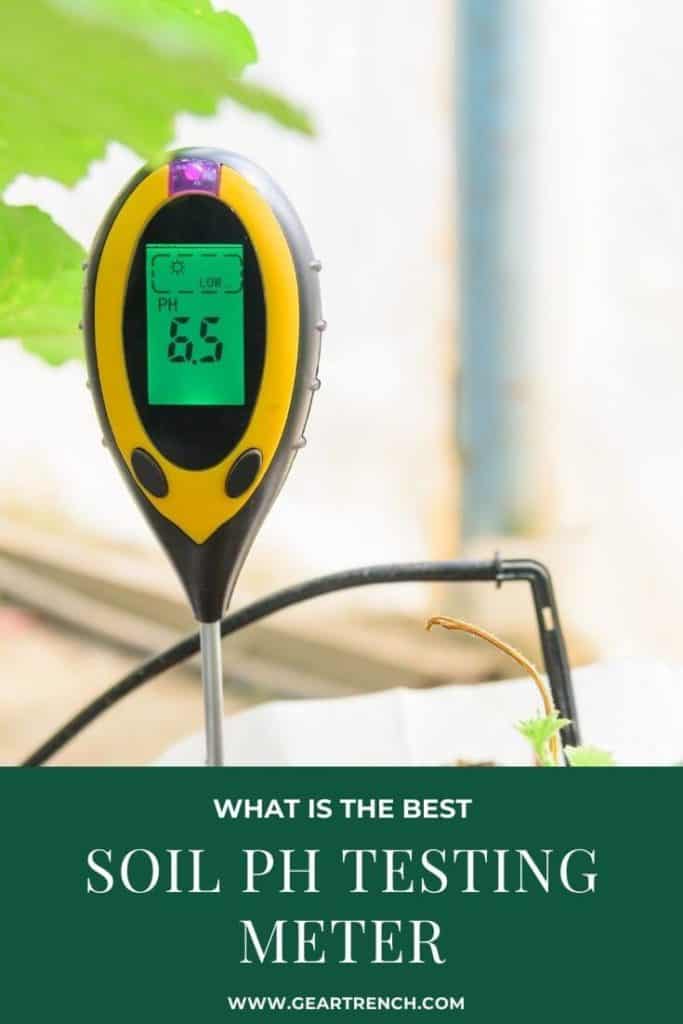
Don’t forget to share this post

